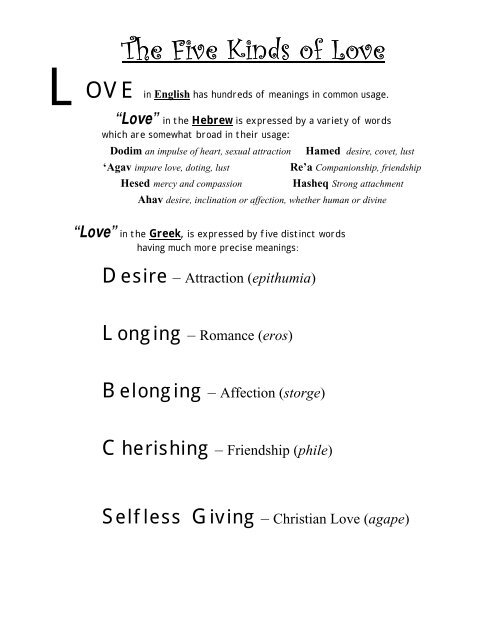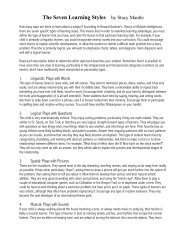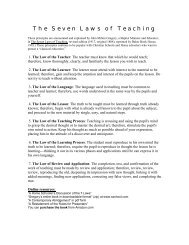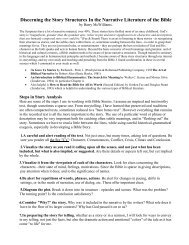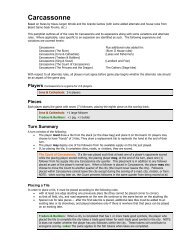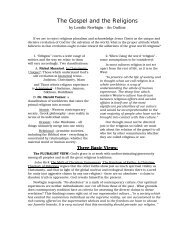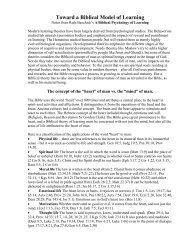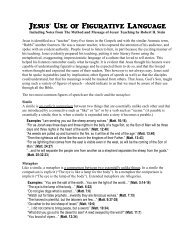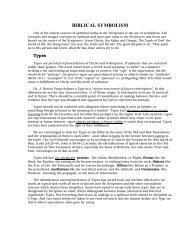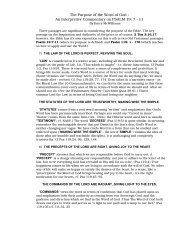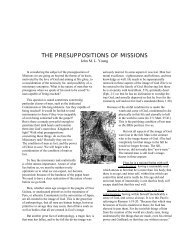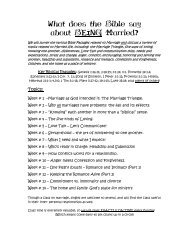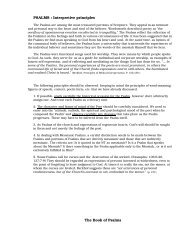The Five Kinds of Love The Five Kinds of Love
The Five Kinds of Love The Five Kinds of Love
The Five Kinds of Love The Five Kinds of Love
Create successful ePaper yourself
Turn your PDF publications into a flip-book with our unique Google optimized e-Paper software.
<strong>The</strong> <strong>Five</strong> <strong>Kinds</strong> <strong>of</strong> <strong>Love</strong><br />
LOVE<br />
in English has hundreds <strong>of</strong> meanings in common usage.<br />
“<strong>Love</strong>” in the Hebrew is expressed by a variety <strong>of</strong> words<br />
which are somewhat broad in their usage:<br />
Dodim an impulse <strong>of</strong> heart, sexual attraction<br />
‘Agav impure love, doting, lust<br />
Hesed mercy and compassion<br />
Hamed desire, covet, lust<br />
Re’a Companionship, friendship<br />
Hasheq Strong attachment<br />
Ahav desire, inclination or affection, whether human or divine<br />
“<strong>Love</strong>” in the Greek, is expressed by five distinct words<br />
having much more precise meanings:<br />
Desire – Attraction (epithumia)<br />
Longing – Romance (eros)<br />
Belonging – Affection (storge)<br />
Cherishing – Friendship (phile)<br />
Selfless Giving – Christian <strong>Love</strong> (agape)
Worksheet # 3<br />
Learning to Speak <strong>The</strong> “<strong>Love</strong> Languages”<br />
Strangely enough, one can be loved and accepted un-conditionally and still not feel genuinely loved. What feels like love will vary with the individual – this<br />
is why you must know your mate so well. One person may measure love by the way his material needs are met, or by tangible items such as expensive<br />
gifts. Another may feel loved when her husband helps her with the dishes. One will measure love by the amount <strong>of</strong> time spent together, or by the quality<br />
<strong>of</strong> openness and sharing <strong>of</strong> thoughts between the two. Another desperately needs to hear <strong>of</strong>ten the words: I love you. Still another measures love by<br />
physical affection – hugs and kisses. One person puts a heavy emphasis on the loyalty shown by the mate, especially in public. Another values sensitivity<br />
shown to feelings. Some will measure love by the support given to their personal growth and development. <strong>The</strong>re are so many languages <strong>of</strong> love! While<br />
all I have mentioned are important, some <strong>of</strong> them will have special, even critical significance for your mate on an emotional level. Learn what speaks love<br />
to your partner; then express your love in ways that cannot be doubted. Ed Wheat, <strong>Love</strong> Life, p. 126<br />
Gary Chapman has written a number <strong>of</strong> practical books on what he calls <strong>The</strong> <strong>Five</strong> <strong>Love</strong> Languages (including books relating the “love languages” to<br />
Teens, and to Children.) He suggests that there are five love languages, each with various dialects:<br />
Words <strong>of</strong> Affirmation, Quality Time, Receiving Gifts, Acts <strong>of</strong> Service, Physical Touch.<br />
Seldom do a husband and wife have the same primary love language. Less seldom do families share the same primary love languages. Our primary love<br />
language may change over time. We have "love tanks" that need to be regularly filled. We need to learn to speak our loved ones’ primary love<br />
languages. When your spouse feels secure in your love, they will move toward greater growth and joy. When their love tank is full they will be better able<br />
to impact their world with love. When their love tank is empty, they feel used and worthless, their world feels dark and oppressive. A person’s criticisms<br />
and complaints can be major clues to what their primary love language is. "My spouse’s criticisms about my behavior provide me with the clearest clue to<br />
her primary love language. People tend to criticize their spouse most loudly in the area where they themselves have the deepest emotional need. <strong>The</strong>ir<br />
criticism is an ineffective way <strong>of</strong> pleading for love."<br />
To discern your “<strong>Love</strong> Language,” you will need to consider how do you express and receive love? On a separate sheet, answer the following<br />
questions as specifically as you can. <strong>The</strong>n evaluate your sheet (or have someone else evaluate it for you) and for each statement you made,<br />
write a letter corresponding to the love language that seems most expressed by the statement. For Words <strong>of</strong> Affirmation write "W", Quality Time<br />
"QT", Receiving Gifts "G", Acts <strong>of</strong> Service "A", and Physical Touch "T".<br />
1. How did your parents show they love you? When were the times you felt most loved by them?<br />
2. How do you express love to your spouse (or a close friend)?<br />
3. How do you express love to your children?<br />
Clues for discovering your own primary language:<br />
What does a loved one do or not do that hurts you most deeply?<br />
What type <strong>of</strong> things do you most <strong>of</strong>ten request <strong>of</strong> your spouse?<br />
In what way do you most regularly express love to your spouse?<br />
What first attracted you to your spouse or made you think that he or she cared for you?<br />
Recognize differences between male and female sexual responses. For men, sexual response is generally<br />
linked to physical contact. A man’s desire for sexual contact should not be confused with physical touch being<br />
his primary love language.<br />
Clues for discovering your spouse’s (or a child’s) primary language:<br />
Pay close attention to how they express love to you and others. People tend to try to show love in ways they<br />
want to be loved.<br />
Listen to what they request most <strong>of</strong>ten.<br />
Consider what they complain about most.<br />
Give them choices.<br />
Do not "peg" them into a box. Remember, children’s language may change as they grow.<br />
Be careful discussing the languages with teenagers. <strong>The</strong>y could use them against you!<br />
Run an experiment. If it is still hard to understand what most communicates love, make a best guess <strong>of</strong> what their<br />
primary love language is. Attempt to practice showing love in specific ways in this language for the next two weeks.<br />
See if it makes a difference. If not, try another language for another two weeks.
<strong>Love</strong> Language #1: Words <strong>of</strong> Affirmation<br />
Verbal Compliments; Words <strong>of</strong> Praise - Focus is on something they do that is under their control. Encouraging Words - Focus is on who they are. See the<br />
world from their perspective. Kind Words - Tone is crucial! Humble Words - make requests, not demands. When you make a request, are you affirming<br />
his or her abilities? Indirect Words - How you speak about a loved one not in their presence can have an impact. Words <strong>of</strong> Guidance (especially with<br />
children)<br />
Things to Consider<br />
Think back on the past few days. What specifically have you said to your spouse? If someone else were<br />
listening, how might they understand your words? Would they find them to be <strong>of</strong>ten supportive, critical, or<br />
demanding?<br />
Discuss with your spouse what you say to your children. Evaluate the degree <strong>of</strong> praise and positive guidance<br />
you give.<br />
<strong>Love</strong> Language #2: Quality Time - when we give someone our undivided attention.<br />
Togetherness = Combined focused attention. Quality Conversation A genuine attempt to understand the other person's thoughts, feelings, and desires.<br />
Become both better listerners and better sharers. Quality Activities - Anything in which one or both <strong>of</strong> you has an interest.<br />
Things to Consider<br />
For you and your spouse or you and your family, isolate two or three experiences that brought you very close<br />
and are a source <strong>of</strong> continuing fond memories. Plan a new event that has strong "memory" potential.<br />
What are some things you can do with your spouse or other loved ones on a regular basis? Make a<br />
commitment to do at least two <strong>of</strong> these in the next month.<br />
Look back upon the last major problem or challenge your spouse faced. Write out ways you could have better<br />
achieved the following: (a) less advice and more sympathy; (b) more understanding and fewer solutions; (c)<br />
more questions and fewer conclusions; (d) more attention to the person and less to the problem.<br />
<strong>Love</strong> Language #3: Receiving Gifts<br />
Think about about a gift you received as a child. What made it so special? Come up with at least three things or principles for how to show someone love<br />
through the giving <strong>of</strong> a gift. "Gifts are visual symbols <strong>of</strong> love." "Physical presence in the time <strong>of</strong> crisis is the most powerful gift you can give if your<br />
spouse’s primary love language is receiving gifts. Your body becomes the symbol <strong>of</strong> your love." Children know the difference between a gift and a bribe.<br />
Things to Consider<br />
What gifts have you given your spouse that were particularly appreciated? If this is his or her primary language,<br />
decide to give one token <strong>of</strong> love, however small, in line with those preferences each week for the next month.<br />
Are there situations that your presence is especially important to your spouse or children? Discuss with your<br />
spouse ways you may already be monitoring gift giving and how you can make this an even greater expression<br />
<strong>of</strong> love in your family.<br />
<strong>Love</strong> Language #4: Acts <strong>of</strong> Service "… doing things you know your spouse would like you to do."<br />
Make a list <strong>of</strong> things you know your spouse or a close loved one wants you to do. Be specific and practical. "Requests give direction to love, but demands<br />
stop the flow <strong>of</strong> love." In order to serve well, we must pay attention to our own physical and emotional needs. Who are we really serving and for what<br />
purpose?<br />
Things to Consider:<br />
Choose three simple, but humble tasks that you don’t especially like, but know your spouse would be pleased to<br />
see completed. Surprise your spouse by doing them without being asked.<br />
Many couples feel that they have overcome gender role stereotypes in their relationship but unconscious bias<br />
still remains. Discuss your deepest feelings about sharing all activities and your family history in this regard.<br />
Think back to when you were courting your spouse. What made them feel special? Can you keep doing it?<br />
<strong>Love</strong> Language #5: Physical Touch<br />
Touch is more than sexual. "Don’t make the mistake <strong>of</strong> believing that the touch that brings pleasure to you will also bring pleasure to her."<br />
Things to Consider:<br />
Perhaps you and your spouse have never openly shared with one another the types <strong>of</strong> touching you find<br />
pleasurable. Discuss the emotional, sexual, and psychological dimensions related to all these areas <strong>of</strong> the<br />
body.<br />
Discuss what times it is especially important to be with your spouse -- special events or activities where they<br />
also want you close at hand. Is hugging or other physical expression also important to them at these times?


